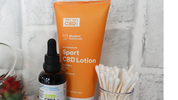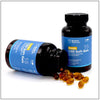CBD for Sleep: Is It Still Worth Trying in 2025?
As the clock strikes nine, a familiar ritual unfolds in many households. The nightly scroll through social media is gradually being replaced by calming teas, cozy weighted blankets, and an intriguing newcomer called CBD. No longer just a trendy buzzword, CBD has emerged as a potential ally for those looking for a way to relax at the end of a long day. But what’s behind this growing interest? We’re not here to sell magic sleep potions but instead, let’s look into why so many are turning to buy CBD to help ease their evenings and improve their nighttime routines.
Introduction
The New Evening Ritual
Sleep struggles affect countless individuals. And while melatonin might have been that go-to solution for some time now, its effectiveness can vary widely among users. Melatonin is often recommended for short-term use only because it directly influences your hormone levels, and long-term use could potentially disrupt your body's natural production of melatonin. Enter CBD, a compound that doesn’t promise instant slumber but may help with relaxation and unwinding after chaos-filled days. People are looking for something more natural, holistic, and, let’s face it, more enjoyable. Maybe that's why CBD for sleep is becoming such a hot topic. It's part of this bigger trend of reclaiming our evenings and prioritizing rest.
Key Takeaways
-
CBD is becoming a popular addition to evening routines.
-
Many users report feeling more relaxed when incorporating CBD into their evening routine.
-
You can buy CBD in different forms, like sleep gummies and tinctures, which may offer various benefits depending on personal preferences.
-
While some studies suggest CBD may help with sleep, more research is needed to confirm its effectiveness.
-
It's important to choose quality CBD products and consult with a healthcare professional before trying it for sleep.
Popular alternatives to the 9 p.m. scroll
-
Reading a physical book
-
Listening to calming music or a podcast
-
Spending time with family or pets
-
Trying meditation or mindfulness exercises
-
Taking a warm bath or shower
It's all about finding what works for you and creating a routine that might help with relaxation or prepare you for sleep. And if that includes exploring how to take CBD oil, then so be it.
Why do some people lean into CBD to soften their evenings?
We're not about pushing miracle cures or anything like that. You won't find us making wild promises about instant sleep. What we are interested in is understanding why more and more people are turning to CBD for sleep as part of their nightly routine. It's not about a quick fix, but more about creating a gentler transition into the evening.
Think of it as exploring a trend, not endorsing a solution. We want to look at the real-world experiences people are having and see if there's something genuinely helpful there, or if it's just hype.
Maybe it's the ritual, maybe it's the placebo effect, or maybe there's something to the science. Let's find out together! We'll look at the different ways people are using it, what they're saying about it, and what the experts have to say. An honest look at the facts about CBD and sleep.
The Case for a Wind-Down Routine
We spend so much time optimizing our days, but how much thought do we give to preparing for sleep? It's like running a marathon without stretching. You might finish, but you're gonna feel it.
That's where a wind-down routine comes in. A wind-down routine is your personal off-switch. It's a collection of habits and activities that help you relax and prepare for sleep. It's not a one-size-fits-all solution, but a customizable approach to better sleep hygiene.
Here's why it matters:
-
May help reduce stress: A routine may help you detach from daily stressors.
-
May improve sleep quality: Consistent routines can help lead to deeper, more restful sleep.
-
Signals bedtime: Your body learns to associate the routine with sleep, making it easier to fall asleep.
And, if you're already thinking about adding CBD sleep gummies to the mix, a consistent routine can help your body recognize when it’s time to rest. Taking your gummies around the same time each night may support more restful, uninterrupted sleep over time.
CBD doesn’t “knock you out”, but people say it helps them unplug
A lot of folks are finding CBD helpful. They say it helps them chill out enough to actually want to sleep. It's more about gently easing into the evening rather than getting knocked out cold. It’s almost like a dimmer switch for your brain, but not an off switch.
Here's the thing, CBD isn't going to solve underlying issues like chronic pain or serious anxiety. If those are keeping you up, it's always best to talk to a doctor. But for the everyday stresses that make it hard to unplug, CBD may help. People report that it helps with:
-
Reducing that racing mind feeling
-
Easing muscle tension
-
Just generally feeling more relaxed before bed
It's not a sedative, it's more like a gentle nudge in the right direction… And honestly, sometimes that's all we need to finally get some sleep after a long day. Plus, it may help you stay asleep longer with less tossing and turning and fewer disruptions.
CBD for Sleep: What People Are Actually Using
CBD gummies
Sleep gummies are a super popular way to take CBD. They're easy to use, usually taste good, and feel a bit like a treat. People like them because they're discreet and convenient. Plus, there's something kind of fun about eating a gummy before bed. Just remember that because they have to go through your digestive system, it can take a little longer to feel the effects. If you're looking for a tasty way to incorporate CBD, selecting the right CBD products might be a good fit.
Tinctures (more customizable & minimalist)
Tinctures are the classic CBD delivery method. They usually come in a little bottle with a dropper, and you put the oil under your tongue or add it to a nighttime snack or beverage. The big advantage here is control. You can easily adjust your dose drop by drop until you find what works for you. Some people also prefer tinctures because they tend to have fewer added ingredients than sleep gummies. The effects often kick in a bit faster since the CBD is absorbed directly into your bloodstream. If you're comparing CBD cream and CBD oil, remember that tinctures offer a different absorption method.
You can find tinctures with different carrier oils, like MCT oil, which some people believe enhances absorption. You can also find a comparison of CBD oil and CBD lotion to see which one is best for you or If you are looking for a comparison of CBD isolate and full-spectrum CBD oil, visit our blog.
Blends with CBN or chamomile
CBD isn't the only player in the sleep game. Lots of products combine it with other ingredients known for their calming or sleep-promoting properties. CBN (cannabinol) is another cannabinoid being explored for its possible calming properties, although more research is needed to understand its effects. It's not psychoactive like THC, and some early research suggests it might help with sleep. It's created when THC degrades, meaning cannabinol concentration is highest in aged cannabis products. Chamomile, valerian root, and lavender are also common additions. These blends may be a nice way to get a little extra help winding down.
It's worth noting that everyone reacts differently to these combinations. What works wonders for one person might not do much for another. Experimentation is key to finding the right blend for your needs.
So…Does It Actually Help?
We're not saying CBD is a guaranteed sleep miracle. But, a lot of people are trying it, and that's worth looking into. It's less about suddenly conking out and more about easing into the evening. People describe it as a subtle shift. Instead of staring at the ceiling for hours, they say it helps them feel a bit more relaxed. It's like taking the edge off, which might just make a real difference when you want to wind down.
It's important to remember that we're not talking about medical studies here. This is more about anecdotal evidence. Though some research is emerging, there aren't a ton of peer-reviewed studies that definitively prove CBD's sleep benefits. But, there are some patterns emerging from the people who are trying it. It's all about personal experience, and everyone's different. For example, some people find that CBD oil for dogs helps their furry friends relax, while others don't see a noticeable difference.
No clinical claims — just real patterns from the CBD-curious crowd
What we are seeing is a lot of people trying CBD products and sharing their experiences. It's like a big, informal focus group, and some interesting patterns are emerging.
Users aren't saying CBD is a miracle cure, but they are reporting some consistent benefits. It's all about managing expectations and understanding that everyone's body reacts differently.
Here's what we're hearing:
-
Helps relax before bed.
-
May help with a less restless night.
-
You might feel a general sense of calm.
From Ritual to Routine: Building Your Own
You're probably intrigued by the idea of CBD as part of your evening, but how do you actually make it happen? It's not just about eating a gummy and hoping for the best. It's about weaving it into a routine that sets you up for a better night's sleep. Let's break down how to build your own personalized wind-down ritual.
Sample nightly routine (30–60 mins before bed)
Here's a sample routine you can adapt:
-
Dim the lights: Start creating a darker environment to stimulate melatonin production.
-
Digital Detox: Put away your phone, tablet, and laptop. The blue light emitted from screens can interfere with sleep.
-
Gentle Activity: Try some light stretching, meditation, or reading a physical book.
-
Journaling: Spend a few minutes writing down your thoughts and feelings. It can help clear your mind of any racing thoughts.
And remember, this is just a starting point. Find what works for you. Maybe it's meditation, maybe it's stretching, maybe it is just lying in bed and staring at the ceiling. The goal is to create a calming ritual that helps you transition from the day to night. If you are considering CBD, make sure to consult with a healthcare professional.
Where does CBD fit in—gummy or dropper?
This is where personal preference comes into play. Do you prefer the convenience and sweetness of a gummy, or the customizable dosage of a tincture? There's no right or wrong answer. Consider these points:
-
Calm gummies: Easy to take, pre-dosed, and often flavored. The effects may take a bit longer to kick in.
-
Tinctures: Offer more control over dosage. You can adjust the amount drop by drop. The effects tend to be felt more quickly.
-
Timing: Experiment to see when the best time to take your CBD is. Some people prefer an hour before bed, while others like to take it right before they turn off the lights. You can find personalized methods to find what works best for you.
What to Know Before You Try It
Before you begin thinking about how to take CBD oil, let's cover a few important things to keep in mind.
-
Choose THC-free if you're sensitive: While the legal limit for THC in hemp products is low at 0.3%, some people are just more sensitive to it. If you're worried about any psychoactive effects, or if you have drug tests coming up, stick with broad-spectrum or CBD isolate products.
-
Look for third-party testing: Reputable CBD companies will have their products tested by an independent lab to verify the CBD content and make sure there aren't any nasty contaminants like pesticides or heavy metals. Check the CBD oil labels for a Certificate of Analysis (COA). If you can't find one, that's a red flag.
-
Start low, be consistent: Start with a low dose (like 5-10mg) and see how you feel. You can always increase it gradually until you find what works for you. And remember, it may work best when you take it consistently over time.
Conclusion
Maybe the Calm Starts Before Sleep
CBD won’t magically fix your sleep, but it might just soften the landing into dreamland. For many, the real value lies in building a consistent evening routine, and CBD products can be a part of that. CBD may be a helpful tool, but it may be more effective when combined with other healthy sleep habits.
But CBD isn’t the only cannabinoid drawing attention. CBN and calming botanicals like chamomile and lavender are also being explored as part of nighttime routines. Some people find that a combination of ingredients works best for them. It is important to approach sleep support holistically. Tune into your body, test what feels right, and give your routine time to settle in.
Here's the final thought:
-
Consider CBD as one piece of a larger puzzle.
-
Focus on creating a relaxing pre-sleep environment.
-
Be patient and consistent with your routine.
Thinking about trying CBD for sleep? Find a product that fits your rhythm, not just your clock. Remember to do your research and consult with a healthcare professional if you have any concerns. More research on CBD is always a good thing!
Frequently Asked Questions
What is CBD and how does it help with sleep?
CBD, or cannabidiol, is a compound found in cannabis plants. Some people use it to help them relax, which might make it easier to sleep.
Are there any side effects of using CBD for sleep?
CBD is generally considered safe, but some people may experience mild side effects like tiredness or changes in appetite.
How should I take CBD for sleep?
You can take CBD in different forms, like calm gummies, oils, or capsules. It's best to try a few to see which one you like best.
Can CBD replace sleep medications?
CBD might help some people with sleep issues, but it shouldn't replace medications without talking to a doctor first.
How long does it take for CBD to work?
The time it takes for CBD to work can vary. Some people feel effects within 30 minutes, while others may take longer.
Is CBD legal everywhere?
CBD laws vary by state and country. It's important to check your local laws before buying or using CBD products.
Disclaimer:
This article is for informational purposes only and is not intended to diagnose, treat, cure, or prevent any medical condition. The statements regarding CBD and sleep have not been evaluated by the Food and Drug Administration (FDA). Please consult with a healthcare professional before starting any new supplement.










